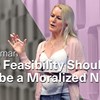notions
Eva Erman: Why feasibility need not and should not be a moralized notion
Venue: Institute for Futures Studies, Holländargatan 13 in Stockholm, or online. Research seminar with Eva Erman, Professor of Political Science at Stockholm University. Her research focuses on democrat

Eva Erman: Why Feasibility Need Not and Should Not be a Moralized Notion
Research seminar with Eva Erman, Professor of Political Science at Stockholm University. Her research focuses on democratic theory, specifically on questions of democracy beyond the state, in a global

Gustav Karreskog Rehbinder
My reasearch is primarily in the intersection of microeconomic theory and experimental economics. In particular, my research aims at understanding boundedly rational decision making, how incentives an
Daniel J. Benjamin & Ori Heffetz: What Do Happiness Data Mean? Evidence from a Survey of Happiness Respondents
Daniel J. Benjamin, Professor (Research) of Economics, Center for Economic and Social Research, University of Southern CaliforniaOri Heffetz, Associate Professor of Economics, Cornell University, Samu
Are the Natural Numbers Fundamentally Ordinals?
Philosophy and Phenomenological Research 99 (3), 564-580 Abstract There are two ways of thinking about the natural numbers: as ordinal numbers or as cardinal numbers. It is, moreover, well‐known that the

Intrinsic motivation and outer sanctions as drivers of prosocial behaviour
Why do we cooperate? This project studies drivers of cooperation, generosity and pro social behaviour.
Jenny Andersson: What is futures studies?
Jenny Andersson, Researcher at Sciences Po & Co-Director of MaxPo in Paris. ABSTRACTAt this seminar, Jenny will present her new book The future of the world. Futurology, futurists and the struggle f
D3.3 Report on regulatory options
De Montfort University Abstract This report reviews various regulatory options that support the ethical and/or responsible development of smart information systems (AI and big data). Its insights will b
The Democratic Boundary Problem Reconsidered
Ethics, Politics & Society. A Journal in Moral and Political Philosophy, N. 1, 2018, pp.89-122. Abstract Who should have a right to take part in which decisions in democratic decision making? This ““a people”, who takes decision in a democratic fashion. However, that a decision is made with a democratic decision method by a certain group of people doesn’t suffice for making the decision democratic or satisfactory from a democratic perspective. The group also has to be the right one. But what makes a group the right one? The criteria by which to identify the members of the people entitled to participate in collective decisions have been surprisingly difficult to pin down. In this paper, I shall revisit some of the problems discussed in my 2005 paper in light of some recent criticism and discussion of my position in the literature, and address a number of new issues.
Restricted completion of sparse partial Latin squares.
Combinatorics, Probability and Computing, 1-21. doi:10.1017/S096354831800055X, Cambridge University Press. Abstract An n × n partial Latin square P is called α-dense if each row and column has at most αnnon-emp times in . An × array where each cell contains a subset of {1,…, } is a (, ) -array if each symbol occurs at most times in each row and column and each cell contains a set of size at most . Combining the notions of completing partial Latin squares and avoiding arrays, we prove that there are constants , > 0 such that, for every positive integer , if is an -dense × partial Latin square, is an × -array, and no cell of contains a symbol that appears in the corresponding cell of , then there is a completion of that avoids ; that is, there is a Latin square that agrees with on every non-empty cell of , and, for each , satisfying 1 ≤ , ≤ , the symbol in position (, ) in does not appear in the corresponding cell of .








